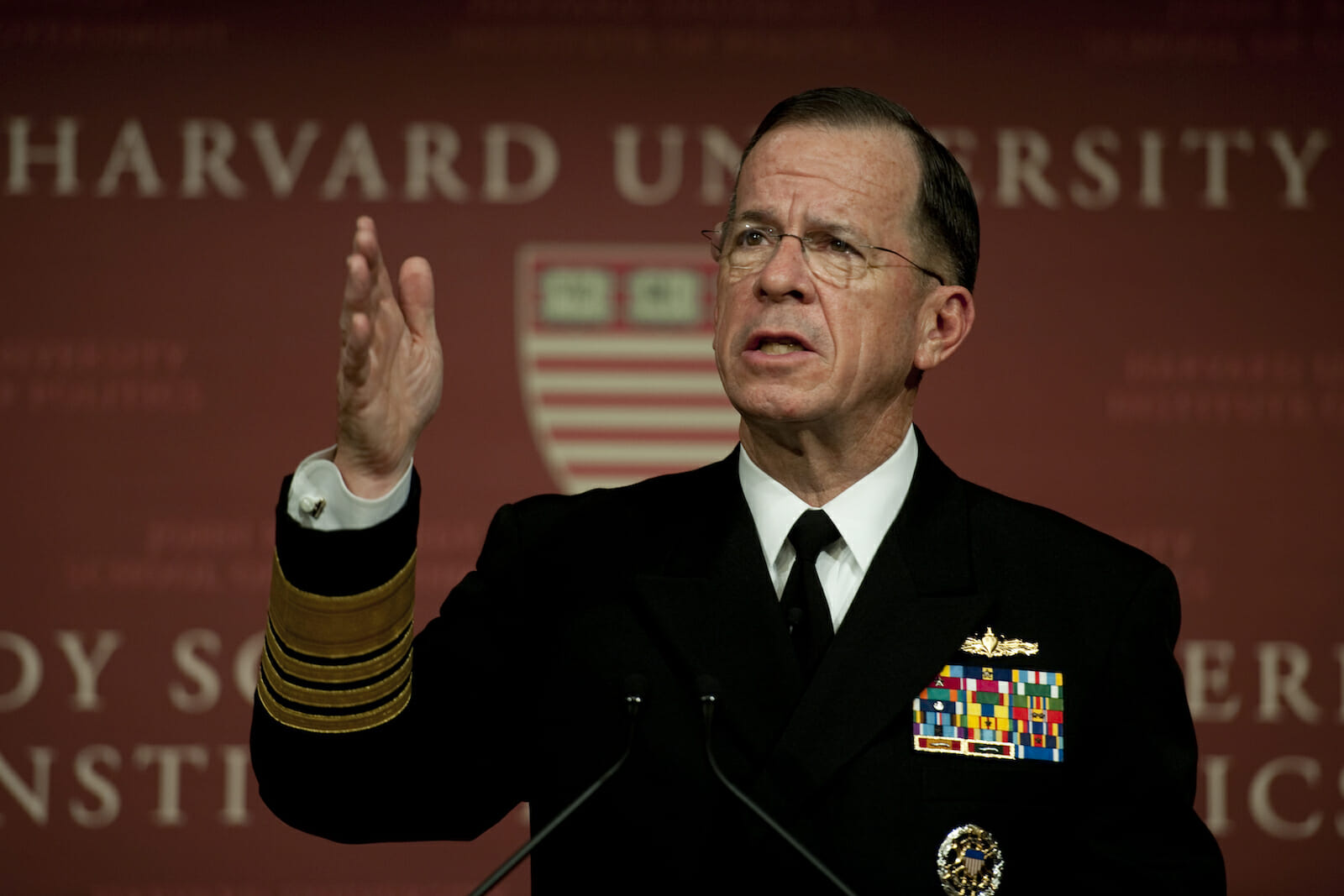
Future of U.S.-Pakistan Relations
America’s diplomatic ties with Pakistan have further deteriorated following critical statements made by Joint Chiefs of Staff Chairman Admiral Mike Mullen earlier last week. In his testimony before a Sept. 22 Senate Armed Services Committee Hearing, Admiral Mullen called out Pakistan’s shadowy Inter Services Intelligence Agency (ISI) for its long-suspected ties to terrorists networks in the region, purporting that the country’s intelligence wing has directly supported recent insurgent attacks on US targets in Afghanistan.
The Haqqani network, led by Jalaluddin Haqqani based out of Pakistan’s lawless Federally Administered Tribal Areas (FATA) was a key ally to the United States during the Soviet-Afghan war in the 1980’s, is quickly becoming the most obvious threat to US interests in the region and US officials claim to have evidence of their involvement in recent high-profile attacks.
Admiral Mullen testified: “There is ample evidence confirming that the Haqqanis were behind the June 28th attack against the Inter-Continental Hotel in Kabul and the September 10th truck bomb attack that killed five Afghans and injured another 96 individuals, 77 of whom were US soldiers.” Mullen continued, “with ISI support, Haqqani operatives planned and conducted (a Sept. 10) truck bomb attack, as well as the assault on our embassy. We also have credible intelligence that they were behind the June 28 attacked against the Inter-Continental Hotel in Kabul and a host of other similar but effective operations.”
The ISI evidence that Admiral Mullen cited is based on reports of cell phones collected by US forces following the Sept. 13 attack on the US Embassy and NATO headquarters in Kabul. Although evidence is still being gathered from the recovered cell phones, the militants are alleged to have called individuals connected to Pakistan’s ISI, which prompted Admiral Mullen’s strong accusations. The implication of Pakistan’s ISI ties with the Haqqani network have prompted a feisty response from Pakistani Government officials.
Interior Minister Rehman Malik contends that America is to blame for the Haqqani network’s rise in the ranks of terror groups, “the Haqqani network was trained and produced by the CIA.”
Malik also insisted that the Haqqani network is based in Afghanistan and is not operational in Pakistan saying, “those claiming otherwise should give evidence of its presence in Pakistan.” He went on to say “we will fight the terrorists as our forces are capable of handling them and countering any challenge.” Despite Malik’s claim that the Haqqani’s are not present in Pakistan and that his forces are capable of handling a terrorist threat, comments made by an unnamed Pakistani military official contradict this assertion.
The military official is reported to have said that the Pakistani military is stretched too thin battling militants in Northwest Pakistan to take on the Haqqani network at this time. Mullen’s accusation’s have obviously put senior military and government officials on edge, as Pakistani Army Chief General Ashfaq Kayani held an emergency meeting with top commanders on Sunday to discuss the escalating diplomatic tensions.
Media reports also said that military commanders considered retaliatory action in the event the US military unilaterally carries out military strikes to stem the Haqqani’s reach. Pakistani media has also reported that on Monday, a trilateral meeting of intelligence officials from Pakistan, Saudi Arabia, and China will take place to discuss the flare up of US-Pakistani rhetoric.
Even Pakistani religious leaders are jumping into the diplomatic fray. Earlier last week, more than 50 imams associated with the Sunni Ittehad Council (SIC) released a press release threatening jihad if the US were to take unilateral military action and pressing the Pakistani government to cut ties with America to strengthen the country’s ties with China, Turkey, Iran, and Afghanistan.
Pakistan’s continued defiance in dealing with the Haqqani network has prompted some US officials to reconsider America’s aid to its complicated ally in the war on terror, and some are going so far as to say that military action by the US to deal with the Haqqanis should not be ruled out. Last week, Senator Lindsey Graham, who serves on the Senate Armed Services Committee, said: “The sovereign nation of Pakistan is engaging in hostile acts against the United State and our ally Afghanistan that must cease. I will leave it up to the experts, but if the experts believe that we need to elevate our response, they will have a lot of bipartisan support on Capitol Hill.”
But despite what seems to be a united effort by senior government and military officials to pressure the Pakistani government to take action against the Haqqani’s, some policy officials, who have decided its best to stay anonymous, have backtracked on Admiral Mullen’s assertions, saying his case was “overstated.” The policy official went on to say “the Pakistani government has been dealing with Haqqani for a long time and still sees strategic value in guiding Haqqani and using them for their purposes. Its not in their interest to inflame us in a way that an attack on a [U.S.] compound would do.” Officials went on to say that Admiral Mullen’s testimony was misinterpreted and meant to imply broad assistance, not at the direction of the ISI.
Admiral Mullen’s staff was quick to respond to the anonymous government officials statements. “I don’t think the Pakistani reaction was unexpected. The chairman stands by every word of his testimony,” said a senior aide. For now, it seems neither the United States, nor Pakistan, are ready to capitulate over the issues surrounding the Haqqani network. Although ISI’s support for terror networks does not come as news to US officials, this is the first time that the US military or government officials have so openly criticized Pakistan for its duplicity. Diplomatic options, though not exhausted, appear to be an exercise in futility as most officials are ready to reconsider or “reframe our relationship” with Pakistan, as Admiral Mullen put it.
One such option, that is sure to enflame tensions even more, would be to officially designate the Haqqani group a “foreign terrorist organization,” added to the 49 others currently listed. Even though the United States has already sanctioned the Haqqani network’s main leaders (Jalaluddin and his four sons) as foreign terrorists, there is now a renewed push to identify the entire group which is said to be comprised of 10,000-15,000 fighters, despite the fact that it would do little to stop the group’s attacks.
But Admiral Mullen’s testimony has not fallen on deaf ears. In fact, the Obama Administration is currently weighing the option of designating the group a terrorist network. Head of the Senate Intelligence Committee, Senator Dianne Feinstein made her opinion known last week when she issued a press release saying she had urged Secretary Clinton to designate the network a foreign terrorist organization. “There is no question that the Haqqani network meets the standards for designation specified in Section 219 of the Immigration and Nationality Act. It conducts attacks against U.S. targets and personnel in Afghanistan, and poses a continuing threat to American, Afghan, and allied personnel and interests,” Feinstein wrote.
Secretary of State Clinton said that “we are in the final, formal review that has to be undertaken to make a government-wide decision to designate the network as a foreign terrorist organization.” If the Obama Administration declares the Haqqanis a terrorist network, then there will surely be a push to go a step further and declare Pakistan a state sponsor of terror, of which there are only four listed (Cuba, Iran, Sudan, and Syria). Also at stake is the potential role the Haqqanis would play in any future peace talks in Afghanistan, which is speculated to be the reason the US has not designated the group already.
The only other viable option for the United States to combat the Haqqani network besides withdrawing aid, sanctions, or other diplomatic solutions is to step up its unmanned arial drone attacks, which are at the core of US-Pakistani diplomatic tensions; that is, if the US isn’t willing to commit troops on the ground.

